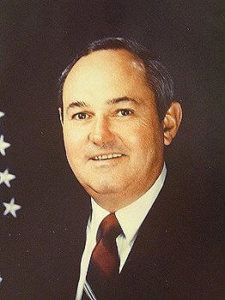
In reading through the official transcripts of the Constitutional Convention, the debates surrounding education were pretty intense. The legislative body moved back and forth over the decision of whether to make the superintendent elective, or appointive. As a related debate, setting forth minimum requirements for a superintendent bubbled to the top of discussions, over and over, again. Those in support of an elected superintendent believed that the public would determine the qualifications for the office by electing the best choice. Those in favor of an appointed superintendent felt strongly that the position should have established requirements to prevent the position from being filled by unqualified appointees as political favors. One legislator pointed out that his daughter who recently graduated from high school could be appointed to the position. Since the public chose Plan A making the superintendent elective with an option to make appointive, the requirements were left off.

Picking up where the last blog left off, it was newly elected Gov. Charles “Buddy” Roemer who had the honor of seeing the first “appointed” superintendent. Roemer, a Harvard graduate, had convinced BESE (including his 3 appointees) that Louisiana’s education system needed reforming, and that Massachusetts native and fellow Harvard graduate, Wilmer Cody, was the man to do it. Cody was hired away from Montgomery County , Alabama.
Under Cody’s guidance, the new LaTIP and LaTEP evaluations were implemented for new incoming teachers and for experienced teachers. The idea was to identify the teachers who could teach, and pay them. Find the teachers who can’t teach, and teach them how to teach. The plans garnered support in the beginning from BESE and both the Louisiana Association of Educators (LAE) and the Louisiana Federation of Teachers (LFT). However, it didn’t take long for the faults in the plan to start showing through. Foreign language teachers were rated poorly by evaluators who couldn’t speak the language they were teaching. A high school Chemistry Teacher of the Year was rated poorly by an elementary level evaluator for poor content knowledge. The complaints began to flow in. In the first year, nearly 35% of teachers were identified as inadequate. Principals began complaining. LAE and LFT joined together in filing a lawsuit while legislators were filing bills to delay the evaluation system saying “without teacher support, it is doomed to fail.” Like the last straw that broke the camel’s back, Roemer stated at LAE’s yearly convention that their opposition to the system didn’t reflect the voices of their membership. Together, LAE and LFT launched a very public campaign to unseat Gov. Roemer.
In the last days of the Roemer administration, Cody sent out the first “school report cards” revealing to parents the attendance, suspensions, expulsions, certifications of teachers, and test scores of the schools their children attended. Members of the teaching profession joined in public outcry against the reports citing invalid and inaccurate data. The results of the report cards were enough fuel for LAE and LFT to declare Roemer as inept and weakened his chances of being reelected. Enter into the picture, Edwin Edwards. Humiliated by his loss to Roemer, Edwards announces his run for a fourth term as governor. He publicly states that he supports accountability in a newly designed evaluation system, but opposes the current plan. He vows to send Wilmer Cody packing back to Massachusetts, along with LaTIP and LaTEP, which he referred to as Cody’s illegitimate stepchildren. Edwards wins. Cody resigns his position and leaves Louisiana, only to return a year later to serve as executive director of one of the first education non-profits established in New Orleans. The organization provided training and certification to aspiring principals.

Both Edwards and BESE proclaim the need for a Louisiana educator to fill the post of superintendent. BESE appoints Raymond Arveson, former superintendent of East Baton Rouge Parish Schools, as interim superintendent because Louisiana was undergoing redistricting, and the BESE elections were postponed a year. The new BESE would want to hire their own superintendent. When the time comes to choose the permanent superintendent, BESE chooses Arveson, and approves a $95k salary; same as Cody. Among the other applicants were retired principal/legislator, Cecil Picard; Sally Clausen, education advisor to the governor; Patrick Cooper, superintendent of West Feliciana Schools and Winston Riddick, Chief Assistant to the Attorney General.
Under the leadership of Arveson, the focus returned to finding ways to support the teaching profession, rather than tear it down. The Louisiana Components of Effective Teaching are introduced with mandated “professional development” embedded. When Edwards leaves offices and newly elected governor, Mike Foster, takes the helm, and Arveson announces his plans to retire. In a speech at a gathering of the LFT, Arveson states, “many candidates for governor falsely claim that Louisiana is at the bottom of the heap in education. They maintain this belief while in office. If Gov. Foster truly believes this is a concern, then fully funding education and paying teachers reasonable salaries must be a priority.” Foster makes the pledge to raise teacher salaries to the southern regional average within two years, or forego his salary, and recommends Cecil Picard to follow Arveson as superintendent. BESE approves Picard and increases his salary to $115k with a $12k allowance for car and housing.

Picard has the distinction of being the longest serving “appointed” superintendent of education. Appointed in 1996, he serves for 11 years, until his death in 2007. He was a retired principal, and at the time of his appointment, served as the Chairman of the Senate Education Committee. He served across multiple governors and BESE boards, both Republican and Democrat. Under Picard’s leadership, for the first time, a set of academic standards were created and adopted to provide a framework of what children should learn at each stage of their educational journey. The Grade Level Expectations (GLEs) were rated by national education groups as the 2nd best in the nation; just under Massachusetts. Graduation rates began to show some improvement.
Picard’s death occurred in the last year of Gov. Kathleen Blanco’s administration. After a series of missteps following Hurricane Katrina, Blanco had lost credibility as a governor and had little influence over policy. BESE appointed New Orleans attorney and graduate of the Broad Foundation Academy of Superintendents, Paul Pastorek, to follow Picard as superintendent. Pastorek had previously served on BESE as an appointee of Gov. Foster and held the position of president. Upon his appointment, BESE approved an outrageous $425k salary; nearly four times more than previous superintendent, Picard.

Shortly after taking the position, Pastorek taps fellow Broad graduate, John White, to serve as superintendent of the Recovery School District created in New Orleans just prior to Hurricane Katrina. Under Pastorek’s leadership, more stringent truancy policies are adopted. The legal dropout age is changed from 16 to 18. The GLEs were fully implemented, the graduate rate steadily rose from around 66% to just under 75%. In the final year of his appointment, Pastorek, Jindal and BESE President, Chas Roemer (son of former governor, Charles “Buddy” Roemer) sign in agreement to adopt the Common Core State Standards (CCSS) as Louisiana’s academic standards. BESE approves and adopts the standards. Shortly after, Pastorek resigns his post to accept employment in Washington, DC.
During that same time, the public was beginning to push back against Pastorek’s policies. He had initiated a plan to take the New Orleans recovery model statewide and planned the takeover of schools in East Baton Rouge and Caddo parish. In 2009, an attempt to prevent an unqualified person from ever being appointed again had been made. Former teacher and member of the House of Representatives, Patricia Haynes-Smith, introduced a bill to require the superintendent of education to possess, at a minimum, the same qualifications required of a parish superintendent. The House Education Committee amended the bill to provide an exception for BESE to waive the requirement with a 2/3 majority vote. The bill passed. The education reform interest groups had just under two years to formulate a plan to secure the 2/3 vote before Pastorek’s resignation. They did. The groundwork was laid, and in January 2012, with 2nd term Governor Jindal’s recommendation, the newly elected BESE appointed John White to fill the position of superintendent and secured a four year contract with a $275k salary. Stay tuned for the follow up blog to learn more about White and why he must vacate his position by June 8, 2017.
Edited: I neglected to include Ollie Tyler who was named as interim superintendent when Pastorek resigned. Tyler, mayor of Shreveport, held the title for a few short months, until White was appointed to the position.

Resources:
American Press 1912 – 2002 _ Tuesday, October 04, 1988 _ 10
American Press 1912 – 2002 _ Friday, December 20, 1991 _ 1
American Press 1912 – 2002 _ Thursday, November 21, 1991 _ 1
American Press 1912 – 2002 _ Wednesday, April 15, 1992 _ 1
American Press 1912 – 2002 _ Friday, May 24, 1996 _ 44
American Press 1912 – 2002 _ Tuesday, August 01, 1995 _ 3
Teacher Evaluation Policy: From Accountability to Professional Development


Question 1: Was the “Patrick Cooper” of West Feliciana referenced in this piece the same one who eventually became Lafayette Parish’s previous superintendent?
Question 2: Were SPED, ESL (English Second Language/English Learners), and Early Childhood certified teachers fairly evaluated by likewise certified coaches or mentors under the LaTip/LaTap as mentioned in this piece?
This series is interesting, regardless of one’s position on standards-based teaching/assessment and the current state superintendent: Helps connect lots of dots in a “paint by numbers” world.
Yes, indeed. The same Patrick Cooper. Yes, LaTIP/LaTAP covered all teachers.
I will send you the full story of Picard’s involvement in the firing of New Orleans teachers, the closing of traditional schools and the charter takeover (as per Supreme Court transcripts) in hopes you will link it in your story.